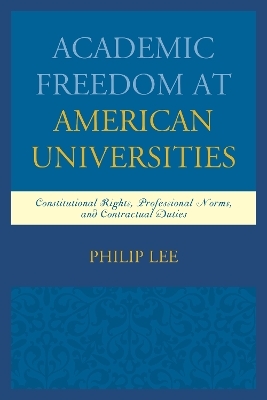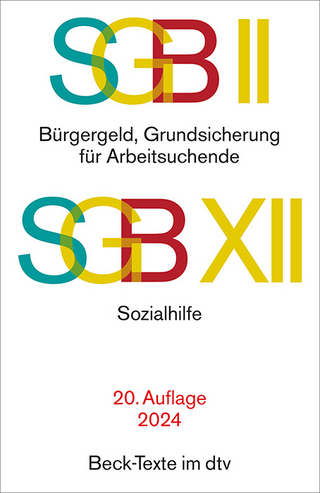
Academic Freedom at American Universities
Constitutional Rights, Professional Norms, and Contractual Duties
Seiten
2016
Lexington Books (Verlag)
978-1-4985-0102-6 (ISBN)
Lexington Books (Verlag)
978-1-4985-0102-6 (ISBN)
Lee argues that the dominant constitutional analysis of academic freedom is insufficient to protect the full range of academic freedom interests that have emerged over time. As an alternative to an exclusively First Amendment foundation for this freedom, it proposes for a contract-law-based conception specifically for professors.
This book details the legal and historical development of institutional and professorial academic freedoms to better understand the relationship between these concepts. While some judges and scholars have focused on the divergence of these protections, this book articulates an aligned theory that brings both the professorial and institutional theories together. It argues that while constitutionally based academic freedom does its job in protecting both public and private universities from excessive state interference, or at the very least it asks the right questions, it is inadequate because it fails to protect many individual professors in the same way. This solution entails using contract law to fill in the gaps that constitutional law leaves open in regard to protecting individual professors.
Contract law is an effective alternative to constitutional law for three reasons. First, unlike constitutional law, it covers professors at both public and private universities. Second, it allows for the consideration of the custom and usage of the academic community as either express or implied contract terms in resolving disputes between universities and professors. Third, contract law enables courts to structure remedies that take into account the specific campus contexts that give rise to various disputes instead of crafting broad remedies that may ill fit certain campus environments.
The proposed reconceptualization of academic freedom merges constitutional protection for institutions and contractual protection for individual professors. This combined approach would provide a more comprehensive framework than is currently available under the predominantly constitutional paradigm of academic freedom.
This book details the legal and historical development of institutional and professorial academic freedoms to better understand the relationship between these concepts. While some judges and scholars have focused on the divergence of these protections, this book articulates an aligned theory that brings both the professorial and institutional theories together. It argues that while constitutionally based academic freedom does its job in protecting both public and private universities from excessive state interference, or at the very least it asks the right questions, it is inadequate because it fails to protect many individual professors in the same way. This solution entails using contract law to fill in the gaps that constitutional law leaves open in regard to protecting individual professors.
Contract law is an effective alternative to constitutional law for three reasons. First, unlike constitutional law, it covers professors at both public and private universities. Second, it allows for the consideration of the custom and usage of the academic community as either express or implied contract terms in resolving disputes between universities and professors. Third, contract law enables courts to structure remedies that take into account the specific campus contexts that give rise to various disputes instead of crafting broad remedies that may ill fit certain campus environments.
The proposed reconceptualization of academic freedom merges constitutional protection for institutions and contractual protection for individual professors. This combined approach would provide a more comprehensive framework than is currently available under the predominantly constitutional paradigm of academic freedom.
Philip Lee is assistant professor of law at University of the District of Columbia David A. Clarke School of Law.
Introduction
Chapter 1: The Crisis of Academic Freedom in the Modern University and the Founding of the AAUP
Chapter 2: The AAUP’s First Policy Declaration in 1915 and its Early Struggle to Defend Academic Freedom
Chapter 3: The AAUP’s Seminal 1940 Statement and Judicially Defined Academic Freedom During the McCarthy Era
Chapter 4: Modern Constitutional Conceptions of Academic Freedom
Chapter 5: The Limitations of Constitutionally Based Professorial Freedom
Chapter 6: Contract Law as an Alternative Foundation for Professorial Freedom
Conclusion
| Erscheinungsdatum | 03.06.2016 |
|---|---|
| Verlagsort | Lanham, MD |
| Sprache | englisch |
| Maße | 151 x 227 mm |
| Gewicht | 277 g |
| Themenwelt | Recht / Steuern ► Arbeits- / Sozialrecht ► Sozialrecht |
| Recht / Steuern ► EU / Internationales Recht | |
| Sozialwissenschaften ► Pädagogik ► Erwachsenenbildung | |
| Sozialwissenschaften ► Politik / Verwaltung ► Staat / Verwaltung | |
| ISBN-10 | 1-4985-0102-8 / 1498501028 |
| ISBN-13 | 978-1-4985-0102-6 / 9781498501026 |
| Zustand | Neuware |
| Haben Sie eine Frage zum Produkt? |
Mehr entdecken
aus dem Bereich
aus dem Bereich
KHG, KHEntgG, FPV, VBE, BPflV, PEPPV, PpUGV, SGB V
Buch | Softcover (2024)
Kohlhammer (Verlag)
76,00 €
Buch | Softcover (2024)
dtv Verlagsgesellschaft
19,90 €


